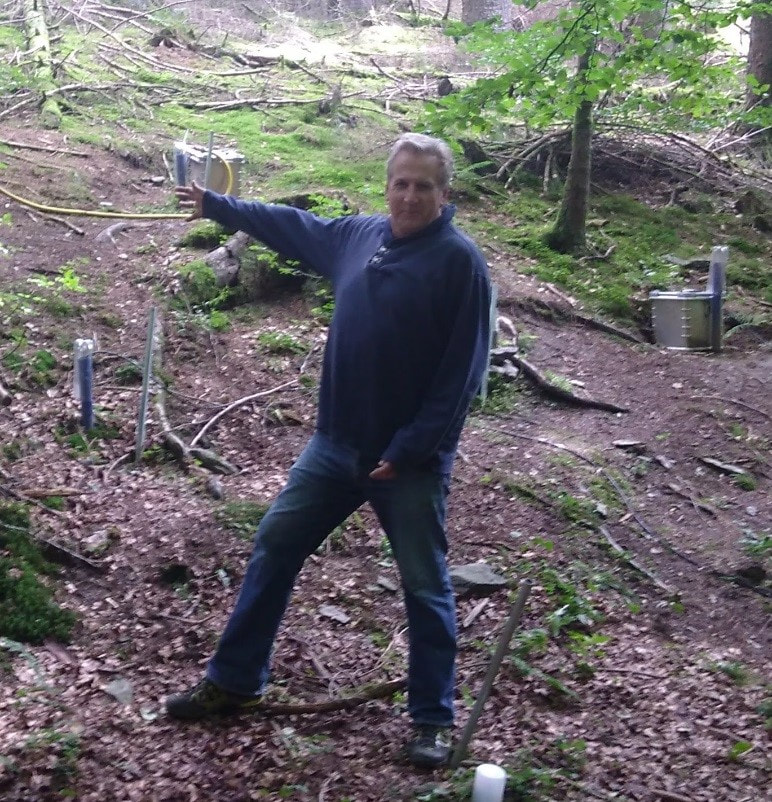When we launched the journal Ecohydrology a number of years ago there was a lengthy debate about this among the associate editors and myself. To date, I have really seen no need to change two of core statements:
Ecohydrology seeks to increase interdisciplinary insights by placing particular emphasis on interactions and associated feedbacks in both space and time between ecological systems and the hydrological cycle. Research in both terrestrial and aquatic systems is of interest provided it explicitly links ecological systems and the hydrologic cycle.
What are your undergraduate and graduate degrees in?
BSc in Geography from Swansea University Wales and PhD in Hydrology from Sheffield University U.K.
How did you arrive at working in/thinking about ecohydrology?
My early career was in Soil Physics and Physical Hydrology. I was particularly interested in how soil structure and macropore patterns influenced water and chemical transport processes and how near-saturated hydraulic properties could be measured and incorporated into flow and chemical transport models. After about 20 years of work in that area I ‘upscaled’ to consider the soil-plant-atmosphere continuum and larger scale catchment hydrologic processes. At about the same time I started some research interactions with foresters interested in how to best identify areas for new plantation forestry in South-West Australia.
Our region is also a ‘canary in the coalmine’ for evaluating how climate change is affecting forests and streamflow because rainfall has been declining since the mid-1970s and temperature has been rising. So, the transition to Forest ecohydrologic work was a natural next step and this has now extended into how regional climate change is impacting on both natural and replanted forests. Work has also expanded to consider broad-scale restoration of degraded lands through reforestation and carbon sequestration and I also have interests in ecohydrologic feedbacks induced by soil water repellency in natural ecosystems.
What do you see as an important emerging area of ecohydrology?
I am going to take a different perspective to other LEAFS here because I believe that for ecohydrology to grow, THE important emerging area is how to teach and incorporate Ecohydrology into the University curriculum. The multi-disciplinary nature of Ecohydrology poses a problem but is not insurmountable. Breaking it down there are two main threads: terrestrial ecohydrology and aquatic ecohydrology. The former requires skills in soil and environmental physics, plant physiology, hydrology and remote sensing. The latter adds skills and understanding of hydrobiology, river management and restoration and possibly limnology. Many of the pressing environmental problems of our time require these skillsets to address them and yet at present no course like this exists anywhere in the world.
Do you have a favorite ecohydrology paper? Describe/explain.
Peter Eagleson’s book ‘Ecohydrology: Darwinian Expression of Vegetation Form and Function’ influenced my thinking about productivity maximization as a target and what constrains this objective. It is particularly relevant when thinking about how ecosystems respond and adjust to climate change and how revegetation schemes can fail if the environmental settings are unrealistic and/or poorly understood.
Choat et al. (2012) Global convergence in the vulnerability of forests to drought. Nature. 491. 10.1038/nature11688. This letter showed how hydraulic safety margins across all world forest biomes are largely independent of mean annual precipitation and thus equally vulnerable to hydraulic failure regardless of their current rainfall environment.
What do you do for fun (apart from ecohydrology)?
Well I am a fly fishing nut, so I do get to see first hand how humans and climate are impacting salmonid distributions around the world.

 RSS Feed
RSS Feed